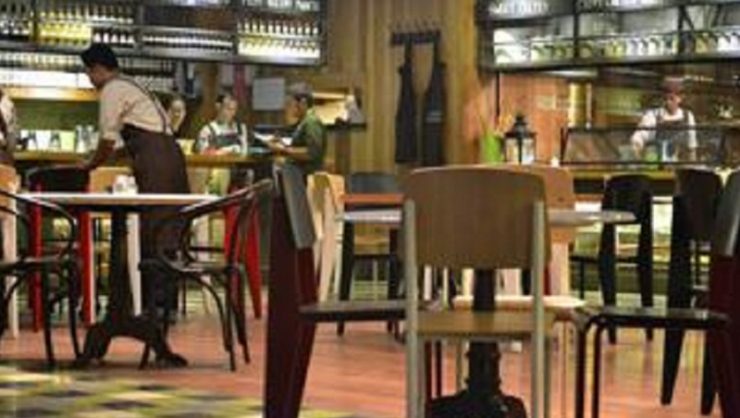A GROUP of customers queues in front of a coffee shop’s entrance in southern Jakarta as a waitress, wearing a face shield and face mask, checks their body temperature using a thermal gun. After they have their temperature checked, people are guided to wash their hands at a portable basin installed near the entrance before they can place orders and enjoy cups of coffee with their friends.
Restaurants and coffee shops in Indonesia’s capital have been implementing health procedures ever since they started to reopen last month. For at least two months, culinary businesses had suspended dine-in services after the provincial government in Jakarta imposed large-scale social restrictions (PSBB), or a partial lockdown, in early April.
However, starting July 5, 2020, the Jakarta administration has gradually lifted restrictions and opened several public facilities, albeit at half capacity, including places of worship and outdoor sports courts, while allowing public transportation, conventional taxi, and online car-hailing services to resume operations in the city.
On June 8, 2020, the provincial government has permitted industries, offices, retail stores, small business shops, museums, art galleries, public libraries, online ride-hailing services, and restaurants to reopen their doors, after it announced a modified and less-strict version of the partial lockdown, known as the transitional PSBB.
Under the transitional PSBB, life is back on the streets. Congestion has been witnessed at most thoroughfares, mainly during busy hours, and customers have started to fill once-empty restaurants and coffee shops. However, their return will entail a high risk of infection unless they practice health protocols, such as maintaining a safe distance, wearing a face mask and/or face shield, washing hands regularly, and avoiding any attempts to touch their lips, nose, and eyes.
Eddy Sutanto, chairman of the restaurant and cafe association of Indonesia (Apkrindo), said most culinary businesses have adjusted to the new norms amid the pandemic.
“The association had urged cafe and restaurant owners to limit their capacities and conduct health procedures, such as checking body temperatures,” Sutanto remarked in an interview this week.
He further stated the association has also urged business owners to arrange seating so it complies with the safe-distance regulation and provide a facility for washing hands, in addition to ensuring customers wear face masks after finishing their meals.
“Our services have adjusted to the health protocols for everyone’s safety,” said Sutanto, who also owns a bakery franchise.
Meanwhile, some customers have said they had no difficulties in adapting to the new dining experience. Ester Yolanda, 29, a social media agency worker in Jakarta, said during the transitional PSBB, she has dined twice with her colleagues. “It feels awkward as we have to minimize interaction when enjoying our meals, while maintaining a safe distance. Before the pandemic, we were used to talking while chewing,” she observed during an interview this week.
Despite health protocols being implemented at the dining place, Yolanda admitted she was somewhat anxious, mainly when hearing other customers sneeze and seeing other people roam in the same space as her without face masks.
“But speaking from my experience, I saw people following the health procedures,” she added.
Olivia Dia, who owns a small business in Greater Jakarta, can relate with Yolanda’s experience. But, she said, she has her own strategy to minimize the risk of infection.
“I pick a dining place which is not packed with too many people,” Dia said adding, she has tried eating out on seven occasions amid the transitional PSBB.
Is it really safe?
Customers enjoy meals and drinks at a restaurant in Jakarta on Saturday (July 18, 2020). Most restaurants in Jakarta have reopened dine-in services for customers ever since the provincial government imposed transitional large-scale social restrictions (PSBB) on June 8, 2020. (ANTARA/Genta Tenri Mawangi)
Although business owners are trying their best to implement health protocols, the risk of contracting COVID-19 still remains, with the World Health Organization acknowledging last week that the SARS-CoV-2 “may also spread through aerosols in the absence of aerosol-generating procedures, particularly in indoor settings with poor ventilation”.
In its revised scientific brief on Transmission of SARS-CoV-2: implications for infection prevention precautions, the WHO has cited recent studies that have found some positive cases related to indoor crowded spaces.
“Outside of medical facilities, some outbreak reports related to indoor crowded spaces have suggested the possibility of aerosol transmission, combined with droplet transmission, for example, during choir practice, in restaurants, or in fitness classes,” the WHO highlighted in its scientific brief.
“In these events, short-range aerosol transmission, particularly, in specific indoor locations, such as crowded and inadequately ventilated spaces over a prolonged period of time with infected persons cannot be ruled out,” the UN heath body added.
Following the WHO’s latest brief, Sutanto has suggested the risk can be contained if the dining places have good ventilation and filtered air conditioners. “In indoor dining places, as I know, the AC (air conditioner) has been designed to filter the air,” he argued.
However, the spokesperson for the COVID-19 national task force, Achmad Yurianto, has warned business owners and companies that the risk of COVID-19 infections in restaurants, offices, and public transportation is higher than other indoor places.
In a daily briefing two days ago, he urged people to be more alert in such areas and be more mindful of health protocols as well as personal hygiene. [antaranews/photo traveltext.id]
















